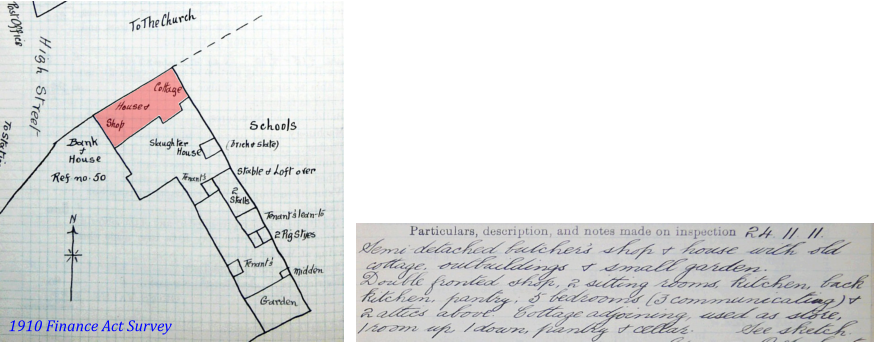These two 17
th
century timber-framed cottages are Grade 2 listed, with new
fronts added in the 18
th
century and some Victorian alterations. (Although joined
to these two properties, the tall building to their right (No. 24 High Street), now a
hairdressers’, was probably built in 1824).
In 1653 Edward Cartwright of Cowley, left land to fund the education of fourteen
poor children of Gnosall at a grammar school. This was known as Cartwright’s
Free School
1
. It never became a grammar school (i.e. it never offered classical
education)
2
.
In the early 19
th
century, when schoolmaster Samuel Harley (1786-1824) ran the
school with paid boarders alongside the 14 free day pupils, the school occupied
these buildings. He had found the situation of the original premises disagreeable
and removed the pupils to his own home, with the agreement of the trustees.
3
On Samuel Harley’s death, Thomas Parton (1791-1865) took over as schoolmaster and continued to occupy the end
house, no. 28, next to the then workhouse, until the late 1830s
4
,
apparently teaching the children nearby – probably at the
Church Institute
5
.
There’s a puzzle concerning which building the classroom had been in. According to an advertisement of 1824
6
it was in
the end house, now No. 28. In 1827 a “dwelling-house … with a large schoolroom attached, occupied for many years by
the late Mr Harley, as a Boarding School” was advertised to let
7
. But the Tithes Awards of 1837 show Thomas Parton in
this house, No. 28.
Parton probably no longer took boarding pupils as none were listed on the censuses, and he did not advertise for them. A
report in 1834
8
said of Parton’s school in its new premises: “Buildings ill adapted, children being taught in a building built
by Bishop Ryder for a Sunday school.” By the late 1830s Parton had moved to Ginger and married, but continued teaching
the Free School until his death in 1855.
(In the late 1830s, all of the houses along this row were owned by Sarah Lowe of the Anchor, with old Mary Plant, widow of
Anchor publican Robert Plant, living at the “new” building (no 24) with mercer James Lindop in no. 26.)
9
A Mr Green, reporting to the Church Commissioners on Gnosall Free School in 1869
10
said: ”The building in which the
school is taught is small and adjoins the churchyard but is otherwise not bad." He also said that it was attended by the 14
free boys, three paid for by the parish, and 12 others, on a sliding scale of fees. However, the farmers were prejudiced
against the school as a “pauper” institution.
By 1881, No. 26 was occupied by butcher Daniel Meadows. There were frequent complaints from the Parochial School (at
the Day Nursery premises) from 1881 to 1907 about the smell coming from his premises – due to the boiling of offal,
removal of manure, removal of pig meat etc. In 1906 the smell was so bad that no one could eat, and parents kept their
children away
11
. Daniel Meadows was also in trouble for poaching, and in 1889 there was court case over a consignment
of rabbits he sent to a customer in Burslem by train; by mistake they went to Macclesfield and mostly died.
1.
The Free Schools and Endowments of Staffordshire, and Their Fulfilment by George Griffith, 1860
2.
Report on Gnosall Free School to the Church Commissioners, 1869
3.
Ibid and Staffordshire Advertiser, 8 Dec. 1817, 11 July 1818, 25 Dec. 1824.
4.
Tithe Awards of 1837
5.
Listed as a school on the Tithes Awards in 1837
6.
Staffordshire Advertiser, 25 Dec. 1824.
7.
Staffordshire Advertiser, 3 March 1827.
8.
Report to the Church Commissioners, quoted in the 1869 report.
9.
Tithe Awards of 1837
10.
Reports to the Church Commissioners on Gnosall Free School, 1868, 1869
11.
School Log Book records, Stafford Record Office.
26-28 Gnosall High Street

1910 Finance Act - plan
Sketch of Nos. 26 and 28 High Street and outbuildings.
The houses are shaded in red.
At this time it was Daniel Meadows butcher’s shop.
Note that the description below shows the cottage (No. 28) is one room
up and 1 down suggesting these may have been the old school rooms.


Click above for home screen




















